

Table of contents
- causes
- Open food storage
- Unlocked waste bins in the house and garden
- Gaps in joints and walls
- Unsuitable living space climate
- Aphid infestation on indoor plants
- 10 effective remedies from the kitchen and nature
- Essential fragrances
- Dust and powder as effective traveling barriers
- Deterrent smells from the spice cupboard and herb bed
- Tea tree oil and water mixture
- Camphor alcohol mix
- Beer Honey Trap
- coffee grounds
- vinegar and vinegar essence
- kieselguhr
- baking soda/baking soda
If hordes of ants boldly march into the house, they accept an involuntary invitation from the residents. Those who panic and resort to chemical insecticides underestimate the intelligence of the disciplined, well-organized insect community. Only when you get to the root of the problem and get rid of the causes will you get rid of the pests again. This guide explains which weak points make your house vulnerable to ants and lists 10 effective means of ecological control.
causes
– That attracts ants into the house –
Anyone who thinks of ants as pests overlooks their important role in the ecosystem. Even a single colony of forest ants preys on up to 120,000 invertebrates every day, among them there are also numerous herbivorous pests that make life difficult for the home gardener make. In addition, ants act as the health police in fields, forests and gardens, eating carrion and cleaning the feathers of birds from parasites. Unfortunately, the busy crawling creatures also have a soft spot for our food, so they boldly use every opportunity to break into the house and help themselves to the supplies. This is not only annoying, but can also be harmful to health, since food can be contaminated and pathogens can be transmitted.
Before you fight an acute infestation with ants in the house, we recommend a detailed analysis of the causes. Only when you know exactly why the insects chose your home for bold raids will you achieve lasting control success. We have compiled the most common triggers for an ant problem in the house with tips for effective countermeasures below:
Open food storage
Freely accessible food and supplies have emerged as the main cause of an infestation of ants in the home. Insects have a keen sense of smell that shows them the way, even from a great distance. First of all, there are individual scouts who hardly catch your eye. The spies use scents to mark the way for the rest of the people, which leads to the dreaded ant trails in the house, purposefully aimed at your kitchen, the pantry and other locations of food and beverages feedstuffs.
This is to do:
- Do not leave food open until consumption
- Store supplies in airtight cans or plastic bags
- Wash used dishes as soon as possible or put them in the dishwasher
- Empty and clean pets' feeding bowls promptly
- Immediately remove leftover food from the floor and wipe the area with a wet cloth
Unlocked waste bins in the house and garden
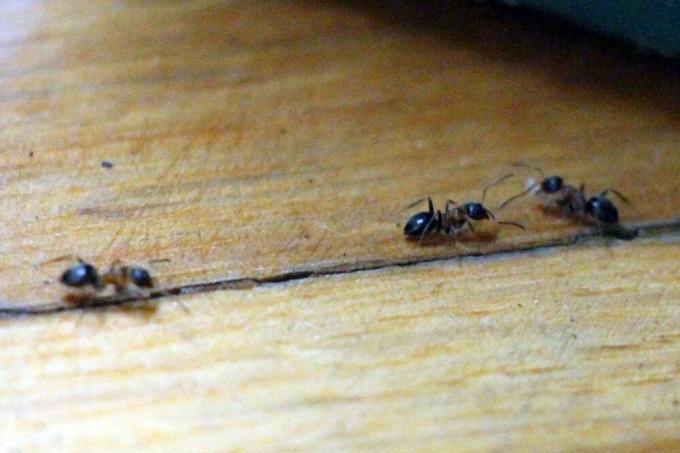
What we consider waste exerts a magical attraction on ants. This applies to organic materials of all kinds that are left in the house and garden. Leftovers and kitchen waste are on the ant colony's menu, as is a large part of the compostable garden waste. This is where the worker ants' unerring sense of smell comes into play, with the help of which they set their sights on your home.
This is to do:
- Use trash cans with lids in the kitchen and empty them daily
- Purchase lockable bins for residual waste and organic waste
- Create a compost heap far from home
- Alternatively, compost garden and vegetable waste in a sealed bin
Tip:
Lockable garbage cans keep a number of pests away from the house. These include bluebottles, rats, martens, raccoons and other animals that roam residential areas on the prowl and are not afraid to enter the home.
Gaps in joints and walls
Tightly locked doors and windows won't stop clever ants from invading your home. Their small body size allows the insects to use the smallest gaps in the masonry as a loophole. Tiny openings in joints also do not remain hidden from the agile Hymenoptera.
This is to do:
- Seal holes in joints and walls with silicone, acrylic or construction foam
- Seal windows and doors with self-adhesive draft seal
Unsuitable living space climate
Ants love a warm, humid climate. If you want to offer approaching scouts as uncomfortable as possible in your house, fresh, airy rooms are a tried and tested means.
This is to do:
- In spring and summer, air your living space several times a day for a few minutes
- Ideally, equip the kitchen and pantry with an air conditioner in summer
Aphid infestation on indoor plants
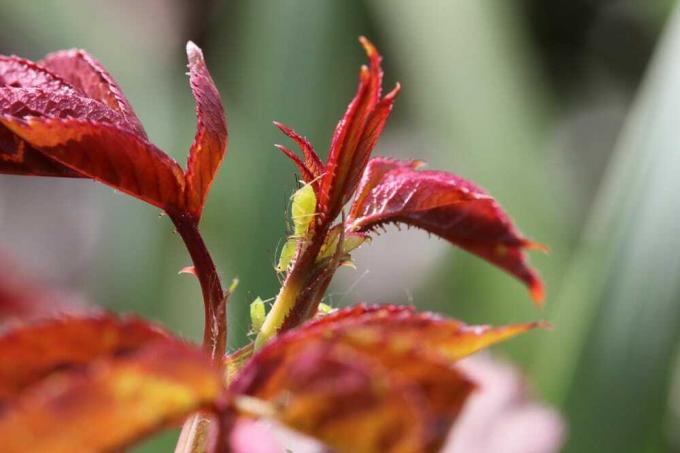
If you can rule out all the causes of the ant plague explained above, your houseplants will come into focus. If aphids have settled on the upper and lower sides of leaves or along shoots, the pests exert an intense attraction on ants. Lice ingest plant sap and excrete sweet honeydew as a waste product. Since ants are very fond of sweets of all kinds, they flock to harvest the honeydew. The clever insects go so far as to relocate aphids from an overpopulated plant in order to optimize the yield of honeydew.
This is to do:
- Check indoor plants regularly for aphids
- Combat an infestation immediately with the classic soft soap solution
- Quarantine affected houseplants outside of your home while you are fighting
10 effective remedies from the kitchen and nature
Eliminating the causes mentioned does little to combat the current ant plague. The communication in the ant colony works so perfectly that your house remains stored as a worthwhile destination in the collective consciousness of the insects, at least for a while. In order to finally end the invasion, the following effective means that do not require chemical toxins come into focus.
Essential fragrances
With the help of essential scents, you use your sensitive sense of smell to beat ants at their own game. By distributing the following strongly scented substances on the walkways and at suspicious entry points, you create an invisible barrier for the pests:
- Lemon slices studded with cloves
- Grated fresh mint leaves or dried peppermint leaves
- Drop clove, lavender or eucalyptus oil onto strips of paper and distribute
- Lay out the juniper, chervil, thyme and ferns in small bundles
Storage containers with sugar, flour or paprika powder are plundered with preference by ants. Place a few bay leaves in each pot and cover the jar with a lid. The delicate smell of ants does not like the spicy smell, so they give it a wide berth despite the tempting content.
Dust and powder as effective traveling barriers
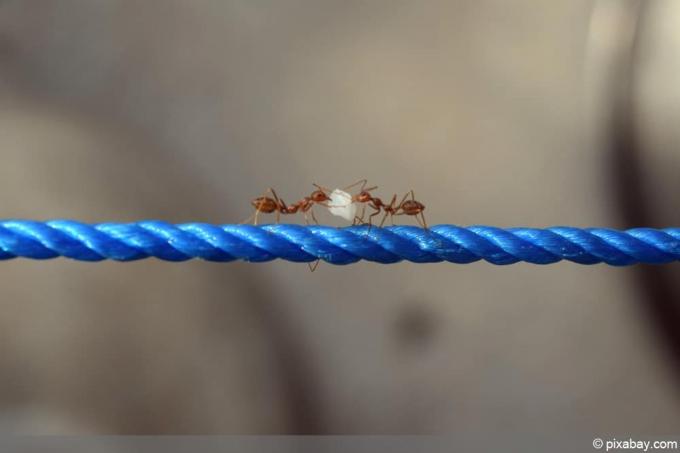
Dusty surfaces deter ants because they don't like walking over the fine-grained material. Scatter all possible infested areas in and in front of the house with the following agents, increase the inhibition threshold for scouts and the entire infantry:
- Draw thick chalk lines and refresh them regularly
- Sprinkle rock flour or charcoal powder
- Scatter cheap baby powder from the discount store
However, this strategy lacks the necessary effectiveness as the sole means of combating ants. In connection with other ecological means, the moving barrier method helps to noticeably reduce the infestation pressure.
Deterrent smells from the spice cupboard and herb bed
There are many a spice on the kitchen shelf that has proven to be an effective remedy against ants in the house. Some plants also thrive in the herb bed, the scent of which curbs an invasion of insects in advance. The following remedies prove to be particularly effective when they are used in different combinations:
- Sprinkle cinnamon, black pepper, chilli powder right on the running streets
- Crush the garlic cloves and lay them out on the windowsill
- Distribute crushed cloves in the kitchen, pantry, and at garbage cans
The power of grated turmeric root or ginger powder against ants is controversial. Proponents are convinced that the Asian plant is effective against an ant plague. The other side swears that the insects are attracted to the spice.
Tea tree oil and water mixture
Highly concentrated tea tree oil has established itself as an effective deterrent against ants. Undiluted use is not advisable, as the intense odor irritates the human mucous membranes. By dissolving the oil, it turns into a natural repellent for ants in the home. Fill a 1 liter spray bottle with warm water and 5 to 10 drops of tea tree oil. As an emulsifier, add a dash of washing-up liquid so that both liquids mix well. Distribute the self-made spray regularly in all places that are colonized by ants. As with most ecological agents, it is also true in this case that the control success only sets in after some time.
Camphor alcohol mix
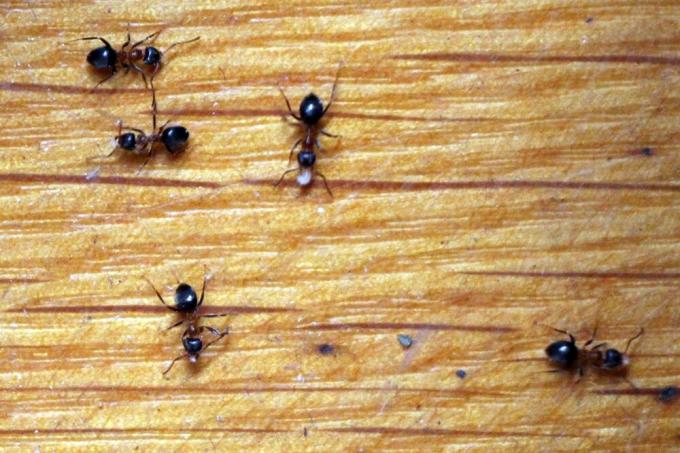
Camphor not only relieves pain and cold symptoms. The medicinal plant also frees you from an ant plague. If all strategies for deterring are in vain, prepare the insects with the following mix:
- Purchase 1 small bottle of camphor at the pharmacy
- Dilute camphor with alcohol in a ratio of 1: 10
- Pour into a flower sprayer and spray directly onto the ants
Tip:
Numerous insect sprays are based on the active ingredient permethrin. Although the substance is derived from the flowers of chrysanthemums, it is still a synthetic toxin. If high concentrations of permethrin enter your body through the air you breathe or through your skin, this can lead to neurotoxic poisoning. Symptoms range from itchy skin to nausea, dizziness, headaches, hearing and vision problems.
Beer Honey Trap
Should hardened hordes of ants prove immune to all repellents, put an end to the plague with the classic beer and honey trap. Pour stale beer into a shallow bowl and stir in a teaspoon of honey. Their craving for sweets is now fatal to the pests. Attracted by the sweet scent of honey, the ants fall into the liquid and drown. Although this trap will work with other liquids, the alcohol content in the beer has an amplifying effect on its effectiveness.
coffee grounds
Coffee grounds attack ants in two ways. On the one hand, the insects can't stand the smell, so it can be used as a fragrant barrier. Furthermore, even small amounts of caffeine are toxic to the ant organism. Therefore, collect coffee grounds from the filter and let them dry. Scattered on walkways, in front of windows and doors, the aroma fends off the approaching armada. If the smell wears off over time, the workers drag coffee beans into the nest as a food reserve. If ants and their brood eat it, the population in your house will decrease significantly after a while.
vinegar and vinegar essence
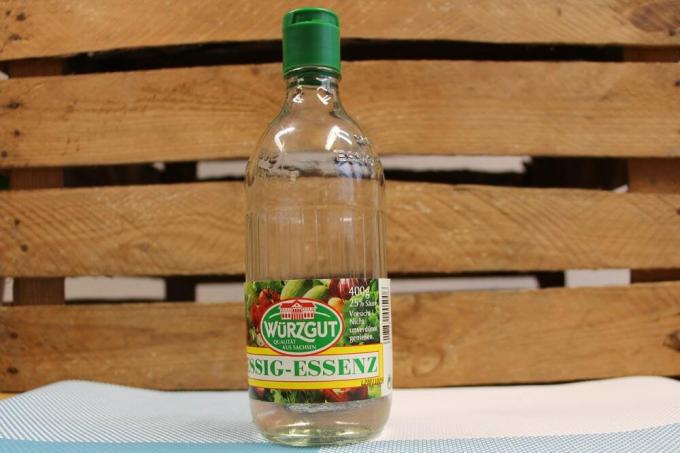
In the long run, vinegar has the potential to wipe out an entire ant colony. Wipe the floor and all work surfaces in the kitchen several times a day with vinegar or vinegar essence. Fill a spray bottle with vinegar water and treat the inside and outside of the window sill, including all possible access points, with the liquid. In doing so, you destroy the scents that ants use to orient themselves. The workers are then so confused that they can neither find their way to the pantry nor their way to the nest. Ultimately, the colony, including the brood and queen, dies due to a lack of food supplies.
kieselguhr
In the round of ecological pesticides against ants, kieselguhr is making a name for itself. This is natural sedimentary rock formed from fossil diatoms. Diatomaceous earth is available in specialist shops as a powder and is also referred to as diatomaceous earth or mountain flour. With a brush or a powder syringe, sprinkle the rock powder directly onto the ants. The bodies then dry out because diatoms pierce the protective layer of the ants. As a precaution, spread diatomaceous earth wherever ants can come into contact with the substance, such as on walkways, behind kitchen cabinets or baseboards.
baking soda/baking soda
The best-known, deadly agent against ants is present in every kitchen cupboard. The main ingredient in baking powder is sodium bicarbonate - or baking soda for short. When ants eat it, the substance changes the pH value in their organism, causing the insects to die. This effect was proven in a scientific experiment at the University of Georgia. To make ants eat the baking soda, do the following:
- Mix baking soda and powdered sugar in a 1:1 ratio
- Spread the agent on the infested areas and ant streets
- Refresh the grit regularly
Female workers who consume the baking powder on site die immediately. Most of the time, the ants carry baking soda and powdered sugar into the nest to feed the queen and brood. Ultimately, the entire ant colony is doomed. For effectiveness, it is important to note that it is actually sodium bicarbonate. Various manufacturers of baking powder are now using cheaper potassium bicarbonate has a similar baking power, but is ineffective as a means of controlling ants in the house is.
 garden editorial
garden editorial I write about everything that interests me in my garden.
Learn more about pests

Identifying wood pests: overview
In nature, insects that break down wood make a valuable contribution. If the wood is a roof truss, for example, the insect becomes a pest that must be combated in order to avoid expensive damage.

Mole Cricket: Should You Fight Them? | Were in the garden
The mole cricket, or Werre, as it is also known, often lives unnoticed in gardens and parks. Because the insect with the scientific name Gryllotalpa gryllotalpa spends a large part of its life underground. Fighting them is only necessary in a few cases.

Combat Whitefly | 11 home remedies for whiteflies
The whitefly is a tiny creature whose presence on our plants can have unpleasant effects. If a few specimens come across a healthy garden, there is hardly anything to fear. If the flies are there in droves, proven home remedies must be used immediately.

Ant remedy | 13 natural remedies against ants
Ants are more than annoying bugs. In nature, they contribute to the preservation of the forest and keep pests away. If they undermine the terrace slabs in the garden or penetrate into the house, they must be fought. Which natural remedies are effective?

How does ant spray work? Is it toxic to humans?
Many people use special sprays from well-known manufacturers when fighting ants. Their effect is indeed efficient. However, these synthetic agents not only have advantages but also disadvantages in terms of environmental impact and health. It is therefore advisable to resort to natural means.

Drive away cockchafers: recognize grubs | 5 natural enemies
"Fly maybeetle!" says an old children's song about death and destruction. In fact, the larvae of the cockchafer, the grubs, can cause considerable damage in some years. How to fight the plague with natural means.

